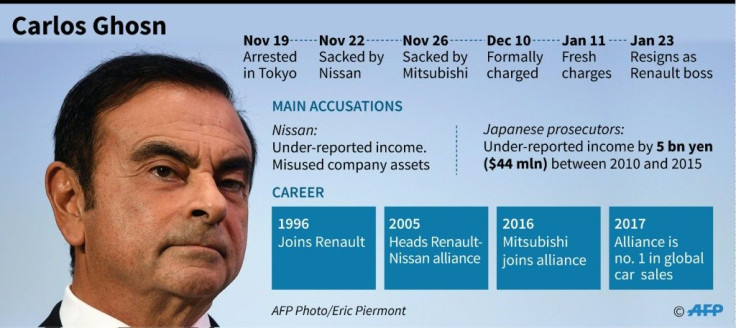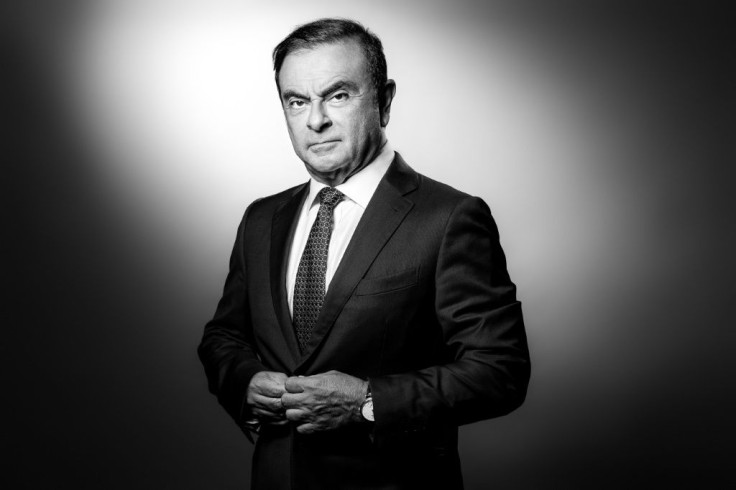Who Is Carlos Ghosn? Nissan CEO Mysteriously Flees Japan For Lebanon, Claiming 'Injustice'

KEY POINTS
- Ghosn was facing trial in Japan for financial misconduct
- Ghosn somehow left Japan without his passports
- Lebanon has no extradition treaty with Japan
Carlos Ghosn, the former chairman of automaker Nissan, has fled Japan – where he faces charges of financial misconduct – for Lebanon and promised to start discussing his case with the media next week.
It remains unclear how Ghosn was able to escape Japan since he had surrendered his passports upon arrest in November 2018. Ghosn, who steadfastly has maintained his innocence, had posted $9 million bail and reportedly was under close watch by Japanese authorities.
He was scheduled to face trial in Japan in 2020 for allegedly underreporting his compensation and for shifting his personal financial losses onto Nissan’s books.
The Lebanese newspaper Al-Joumhouriya reported he arrived in Lebanon on a private jet from Turkey. Ghosn is reportedly in his home in a wealthy enclave of Beirut with his wife Carole under the protection of armed guards.
“I am now in Lebanon and will no longer be held hostage by a rigged Japanese justice system where guilt is presumed, discrimination is rampant, and basic human rights are denied, in flagrant disregard of Japan’s legal obligations under international law and treaties it is bound to uphold,” Ghosn said in a statement released by his spokeswoman. “I have not fled justice -- I have escaped injustice and political persecution. I can now finally communicate freely with the media and look forward to starting next week.”

The Financial Times reported Ghosn was no longer under house arrest in Japan but his movements and communications there had been closely monitored.
Lebanese media reports also suggested Ghosn may have escaped Japan by hiding in a box designed for musical instruments. It also is alleged he may have used a fake name since Japanese government authorities have no record of his leaving Japan.
Junichiro Hironaka, Ghosn’s lawyer in Japan, said Tuesday he did not know of his client’s escape and his legal team still has all three of Ghosn’s passports (Ghosn is a citizen of Lebanon, Brazil and France.) In Lebanon, Ghosn is protected from extradition.
Lebanese media reported the country's General Security Directorate said Ghosn had entered the country legally and no action would be taken against him
Ghosn, 65, was born in Brazil to Lebanese parents and studied in France. He is viewed as something of a folk hero in Lebanon.
“It would have been difficult for him to do this without the assistance of some large organization,” Hironaka said. “I want to ask him, ‘How could he do this to us?’”
During his time in Japan, Ghosn initially was held in jail for 100 days following his November 2018 arrest. He was released after posting bail and subject to strict conditions, including a prohibition against leaving Tokyo. Ghosn was again arrested in April 2019 for planning to hold a public news conference to speak about his case. After that arrest he was barred from communicating with his wife.
Ghosn’s attorneys have claimed Japanese prosecutors have refused to show them documents that they assert proves his guilt.
Ghosn initially arrived in Japan in 1999 after his former employer French automaker Renault acquired Nissan. He was able to revive Nissan’s fortunes after closing factories and firing thousands of workers.
He has since accused his former colleagues at Nissan of orchestrating his arrest.
France’s junior economy minister Agnes Pannier-Runacher said she was “very surprised” by Ghosn’s departure from Japan and that he was “not above the law,”
“If a foreign citizen fled French justice, we would be really angry,” she said.
© Copyright IBTimes 2025. All rights reserved.





















